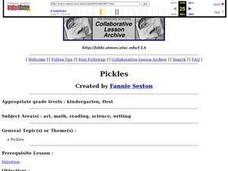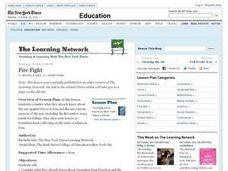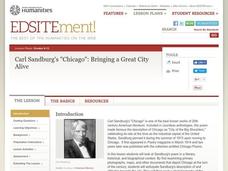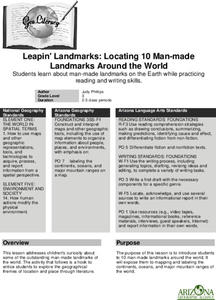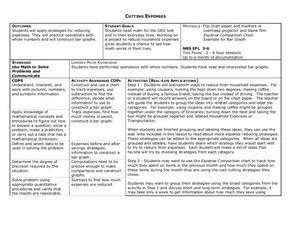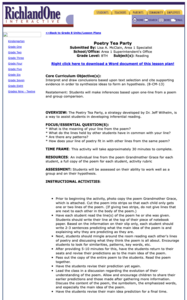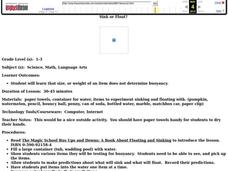Curated OER
Pickles
Young learners compare healthy foods to junk foods. They examine the growing process of a vegetable from a seed all the way to maturity. The book, The Magic School Bus in a Pickle is used. Some nice cross-curricular activities in math,...
Curated OER
Fire Fight
While somewhat dated (students write letters to President George W. Bush about the Iraq War), this lesson could be a good way to reinforce rhetorical reading and critical thinking. Students examine information regarding Operation Iraqi...
Curated OER
Gardening Project-Learning to Grow Seeds
Students demonstrate how to plant seeds. In this gardening lesson, students read the book The Tiny Seed and identify the steps to planting a seed. Students plant their own lima bean seeds in plastic cups and watch it grow.
Curated OER
Sound Blending Lesson Plan
Mr. Snowman wants to help emerging readers understand compound words, so he segments some familiar words to help them see that they are made of two distinct words. Learners repeat the words, both segmented and blended, and observe them...
Curated OER
A Colony is Born : Lesson 5 - Dear Mem
Discover colonies! Young historians will listen to a primary source journal entry read aloud with a backdrop of wave sounds. They discuss the entry, add historical facts to a chart and personal insights to another. Then they listen to...
Curated OER
Carl Sandburg's "Chicago": Bringing a Great City Alive
Students examine the historical and cultural context in Sandburg's poem. The poetic devices of personification and apostrophe are utilized in the poem and identified by Students.
Curated OER
Carl Sandburg's "Chicago": Bringing a Great City Alive
Carl Sandburg composed poetry that conveyed a time and place in American Literature and history. Learners identify the literary techniques he uses to describe the historical and cultural context of living in Chicago. They define the...
Curated OER
Sink or Float?
Have your class explore density and buoyancy using this resource. Learners read the book Who Sank the Boat, and use several items, such as rubber balls, bottle caps, wood, and other household items to conduct an experiment. Using a tub...
Curated OER
Leapin' Landmarks: Locating 10 man-made landmarks around the world
Third graders engage in a lesson which addresses their curiosity about some of the outstanding people-made landmarks of the world. They explore the geographical themes of location and place through literature.
Curated OER
Cutting Expenses
Learners explore budgeting. In this finance and math lesson, students brainstorm ways in which households could save money. Learners view websites that give cost reducing ideas. Students complete an expense comparison chart and use the...
Curated OER
Sink or Float?
Students investigate whether different objects sink or float in water using the Scientific Method. They listen to the book "Christopher Columbus" by Stephen Krensky, identify the steps of the Scientific Method, conduct the sink or float...
Curated OER
Growing Vegetable Soup
Students use children's literature in order to think about the concept of creating a garden. This is done through conducting simple research about types of plants that could be grown in the area and how to care for them. Then the garden...
Curated OER
Bouncing Bubbles
Students complete a variety of activities exploring the joys and science of bubbles. They listen to the book "Bubbles Bubbles" by Mercer Mayer, create a bubble picture using Kid Pix, and explore blowing bubbles. Students experiment...
Curated OER
Poetry Tea Party
Studetns make inferences based upone one-line poetry and group comparison. In this poetry lesson, 9th graders read strips from a poem and write prediction sentences for the poem. Students read each other's poetry lines and then read the...
Curated OER
The Big E
Sixth graders explore predictions and estimation. In this math lesson, 6th graders analyze data and make predictions based on the past years data.
Curated OER
Sink or Float?
Students predict and explore to discover which objects sink or float in fresh and salt water, predict how salt affect objects, write predictions on T chart, discuss difference between man-made and natural waters, and graph results.
Curated OER
A Day at the Fair
Students should be able to read this story and know one to one matching, read repetive sentences, where to begin when reading, and use speech balloons appropriately. They predict what happens in the story before reading with a small...
Curated OER
Wild Things Are Here
Students engage in a literature study for the book Where The Wild Things Are. The skill of prediction is practiced as they preview the story as a whole class. The teacher models reading fluency, pronunciation, and phonetic skills while...
Curated OER
If You Give a Pig a Pancake - P is for Pancakes!
Students read "If you give a pig a pancake" then write the letter P with pancake batter on a griddle tablet for a yummy treat to eat!
Curated OER
Sailing, Sailing
In this sailing lesson, youngsters read The Wreck of the Zephyr, and attempt to predict the outcome of the story. They draw a picture of a sailboat, identify its characteristics, and write their own fictional sailing story.
Curated OER
Sink or Float?
Students predict and test different items to see if they sink or float. In this sink and float lesson plan, students predict whether an item is buoyant or not, and learn that size and weight do not matter when it comes to buoyancy.
Curated OER
A Walk Around the School: Mapping Places Near and Far
After reading Pat Hutchins’ Rosie’s Walk, have your young cartographers create a map of Rosie’s walk. Then lead them on a walk around the school. When you return class members sequence the walk by making a list of how the class got from...
Curated OER
Red Leaf, Yellow Leaf
Students discuss the differences between a storybook and an information book. Students use various materials found in nature to make a nature collage. Students make a nature dictionary using pictures and their own definitions from the...
Curated OER
Flight Formation: The V's Have It!
Read, revisit, and reflect. Older elementary students summarize main idea 6using key details. They consider the V formation that birds fly in, summarize an informational text, and write critical thinking questions.


